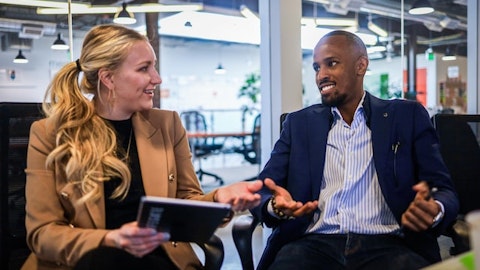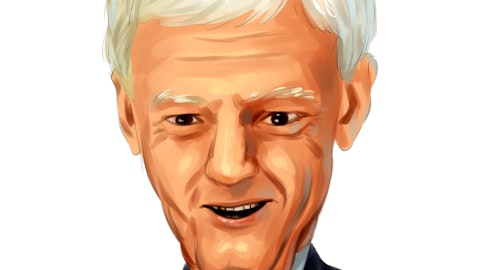Bill Wilson: Yeah, no, great question, Jim. And I expect us to return to growth from a subscriber basis, from revenue and profit basis in the back half of 2024. I’m not sure if that’s Q3 or Q4, but that’s my general timeframe in my perspective right now. As you know, Jim, with the subscription business, a lot of what transpires over the next six months is predicated on what’s happened over the last three to six months. So I think the timeframe is Q3, Q4. I think there’s a number of things that we’ve done internally that I’ve outlined on this call as well as previous calls. We’ve also increased some product features in terms of like we’re now offering a CRM. We’re now offering things like invoicing for our clients. Email marketing is enhanced.
So we continue to make product improvements. Most importantly, I think our service model is being improved and continues to be improved. We’re building certain tools, some of those are helping us leveraging AI to be smarter. When people are calling in, we have more information at our fingertips to handle their needs. Things like that. So my hope is that, obviously, we’re not in a recession next year and that interest rates start to come down in the back half of next year, but at a minimum, don’t continue to increase at the pace they did so far this year. I think outside of one other time in the last 50 years, interest rates raised the most in the last 12 month period than any other period. And good news I think is inflation looks like it’s starting to come down, and if that continues and that is correct, I think that has a dramatic impact on these smaller businesses that have been so hurt in this environment.
I’ll turn it back to you, Jim.
Jim Goss: Okay. Just a couple of other things. One is that political is a small but important and meaningful category for you. But I’m wondering if you think the center there are more options, especially in alone digital lines. If that potentially eats away at some of the political revenues where you see — having you generate and which has been enough to tilt the balance a little bit in your revenue line, especially in the third and fourth quarters?
Bill Wilson: You’re exactly right. Great question. And we’re obviously very much looking forward to next year in political. Again, I think we shared in 2020, the last presidential election, it was an all-time high in terms of political revenue. There was obviously a lot of competition from digital and other things out there for any media like there is every day, but it’s at an all-time high. So I think in particular, obviously, TV benefited tremendously. But when you look at radio’s reach and we don’t talk a lot about this on these calls because for us we treat radio as a mature cash cow business. But we love radio, and it is the number one reach medium in the United States, reaching 93% of Americans on a weekly basis. When I tell people more people listen to AM/FM radio today than 10 years ago and 20 years ago, they can’t believe it.
So I think as it relates to the regional impact for political candidates, they know — and political issues. So I expect if not matching the $16 million, our expectation is $14 million to $16 million our political next year, and that’s coming off of this year being under $3 million. So going back to your main point, Jim, next year, I think, is a great opportunity for us in terms of political revenue. The Townsquare rebuild coming back on and growing in the back half of the year. And obviously, our digital advertising has and continues to be differentiated in driving and propelling our growth for the last several years.
Jim Goss: Okay. One last one. Just sort of a general thought. The FCC now has the chair and the full complement. Is there anything on the docket that might have any impact for Townsquare?
Bill Wilson: Yeah. Look, A, I’m very glad that’s transpired. As you know, there was also a ruling recently where they had — they have to do a quadrennial review, which they didn’t do. So in general, I think people on this call know from prior times, I believe, we should be deregulating and the fact that we are caps in general to four FMs and two AMs in our size markets when we’re facing competition that uncapped, be it a Spotify or be it others in the zone, I just don’t think is appropriate and fair. So my expectation is — I don’t know when, but I think it’s a when question, not an if question. When the FCC starts to recognize the media landscape has tremendously changed in the last 20 years. I mean, it’s changing dramatically every few years.
So to keep the same archaic rules that were in place 20 years ago, I personally believe does not make sense, and I’m glad the FCC has now had a full firm. And I expect as they review this over time, things will benefit Townsquare like deregulation. I don’t know when that will happen, but I believe it will happen, Jim.
Jim Goss: All right. Well, thank you very much for taking my questions.
Operator: Our next question is from Michael Kupinski with NOBLE Capital Markets.
Michael Kupinski: Thank you. Just a couple of quick ones. I mean you mentioned connected TV as one of the key categories in Ignite. And I was just wondering if you can just talk a little bit about what’s driving that performance and then also, is it just more Fast Channel is more connect — connected TVs are just that we’re seeing more support, more volume? And then also how much is connected TV related advertising as a percent of total Ignite advertising?
Bill Wilson: Thank you, Michael. Yeah, we’re tremendously excited. For the first time, really in our company’s history, we’re able to compete head-to-head with television. We couldn’t do that even five, six years ago. And today, getting to your second part of your question, seems like it’s the fastest growing part of our programmatic offering. Obviously, we’re competing with great local television providers in our markets who have owned and operated and as well as programmatic. And we see a great advantage because we’re not favoring anything. We’re focused on the audience and the results, and we don’t need to look at, okay, how do we — how are we managing our own cable inventory or TV spot? Because we don’t have it. So I think it’s been very beneficial for us.



